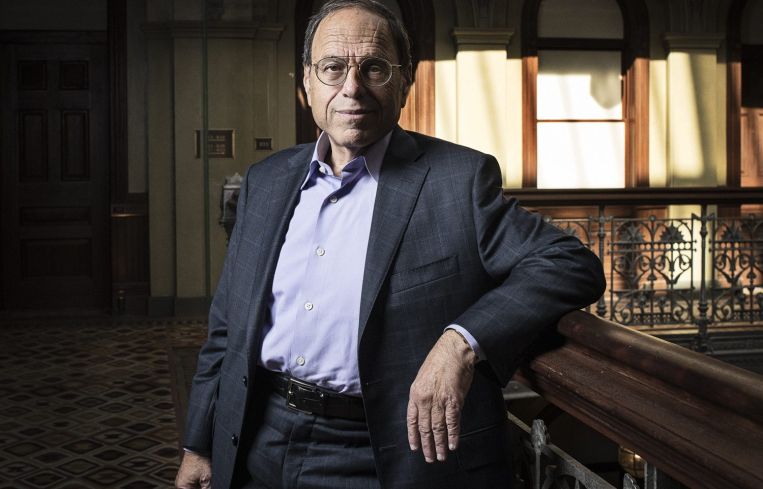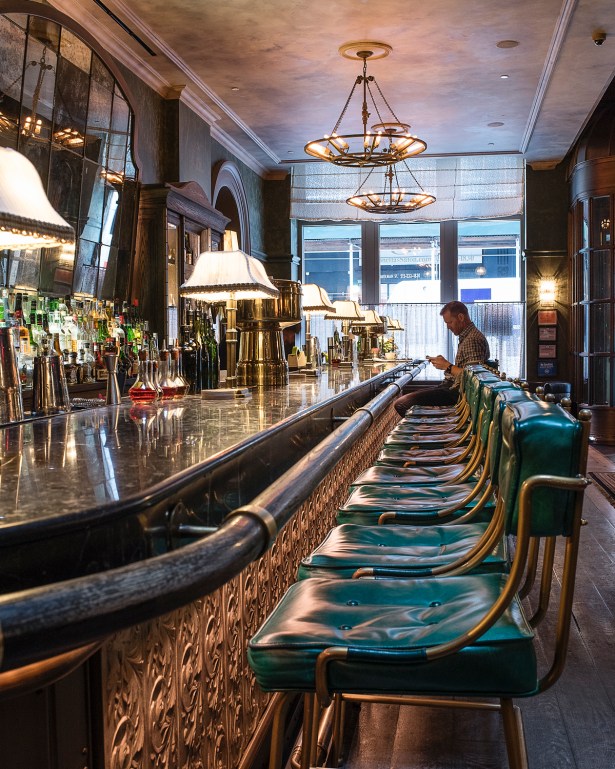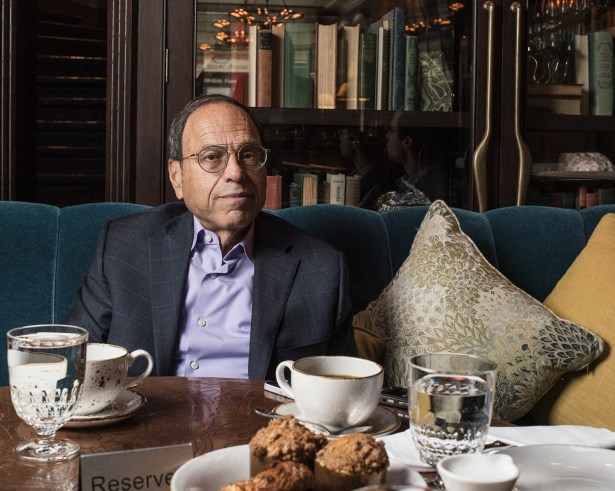GFI’s Allen Gross Talks Downtown and the Old-Time Vibes at his Beekman Hotel
By Matt Grossman October 25, 2017 9:00 am
reprints
Below the room’s expansive sunlit atrium, Allen Gross surveyed the sumptuous lobby of the Beekman one morning last week with the abiding ease of a master of delayed gratification. Munching on a muffin from Temple Court, Tom Colicchio’s lobby restaurant, Gross recounted walking past this venerable old building for years before winning the chance to develop it.
But the native New Yorker who founded and still presides over GFI Capital Resources Group has never minded taking his time. On the way to amassing a residential portfolio that controls 16,000 apartments throughout the country, Gross detoured into law (he has a degree from New York University) and finance before discovering he had the makings of a decent developer.
For nearly 40 years, Gross, who through a spokesman declined to give his age, has thrived as a creator of condominiums, including sold-out towers in Brooklyn’s Williamsburg and Greenpoint and Manhattan that he manages from his City Hall-area offices. That gave him plenty of time to dream about what might be in the terra-cotta, renaissance-revival building he walked past every day—built in the 1880s.
Last August, his patience paid off when the hotel he’d long envisioned there quickly became the city’s most talked-about opening of 2016. That its interior earned notice as a paragon of design was no surprise. At his other Manhattan lodgings—the Ace Hotel and the NoMad Hotel, in Midtown South—Gross had made winning those plaudits routine. The popularity of the adjacent condominiums, the Beekman Residences, marks for Gross the icing on the cake.
But if you’re an out-of-towner who’s bedded down at Gross’s lodgings in the past, rest assured that his newest is not just more of the same. For one, you’ll want to consult your subway map—the Beekman, at 123 Nassau Street, is a bit farther downtown than the last New York hotel you visited.
For another, this design is one that worships the historic building it occupies. From the way Gross lovingly peels back the corner of a rug to show off the 130-year-old tile underneath, it’s clear that he does, too.
Commercial Observer: When the Ace Hotel opened on West 29th Street and Broadway in 2009, all these New York cool kids adopted the lobby as a place to just hang out. What goes into making a space with that kind of cachet?
Allen Gross: In reality, we were the first WeWork, if you think about it. The biggest challenge of the Ace was, Who’s going to go to that part of town? When you walked down there, you saw people walking around with big black garbage bags selling knockoffs [of handbags]—that, and a couple of homeless people. So how do you get people to come to someplace off the beaten path? The whole idea of the lobby was to give people a place to enjoy themselves. Once you have a herd mentality, more people come.
I know you went out and found some great collaborators.
The idea was, let’s take 50 out-of-work artists and let them design the rooms. Let them do the artwork. And we mixed that with great food and beverage.
Wasn’t dining one of the hotel’s main draws?
One of the most popular restaurateurs at that time was April Bloomfield from the Spotted Pig. We brought her into the building and showed her our vision for what we would create. The worst thing is when I travel and see a restaurant and nobody’s in it—I don’t want to eat there. When you see a packed restaurant, that’s where you want to eat.
And coffee brought people in, too, didn’t it?
We set up Stumptown [Coffee Roasters], which no one had ever heard of before. It was the first Stumptown anywhere outside of Seattle. It was nowhere! There was never a Stumptown. To this day, people are still standing on line for that coffee because it’s probably the best coffee.
And now eight years later, here we are at the Beekman, two miles farther downtown. What brought your attention to this neighborhood?
My office has been down the block from here since 1991. Many times we wanted to do something Downtown, but every time we started getting involved, something happened. Either it was an economic downturn, or it was 9/11. Something always happened. We really didn’t feel that this was a location that was going to evolve. No one ever stayed here on the weekends. It was a four-days-a-week business.
When did that start to change?
After 9/11, you have a rebuilding process. You have the 9/11 Memorial, which is probably the No. 1 tourist attraction in the world. Now go to Fulton Station. You have the PATH and you have [many] subway lines. And then for retail, you have Brookfield [Place] and Westfield [World Trade Center] down here. I looked at that, and I said, “It’s coming.”
How did this particular building, at 123 Nassau Street, catch your attention?
The building closed down about 30 years ago, and it was just lying dormant. There were about 200 people who wanted to develop it. But nothing happened. They couldn’t make it work because it was a landmarked building and there’s so much involved. Not only do you have to have a design, but it’s got to work economically. Nobody could make it work.
What were the constraints?
The maximum you could have gotten in here was 130 rooms. That’s not very efficient. Second, where do you put all the mechanicals? You can’t put it on the roof because it’s a landmark building. So where do you put it? Have you ever tried messing around with a 130-year-old building? The bottom line is, everybody else walked away from this deal. It was like the pink elephant in the room. All of a sudden it hit me: The only way to make [the Beekman] work is building a tower next to it and put in condos to bring down the construction cost per room. We were successful in getting the lot next door [at Five Beekman Street], and we built a 650-foot building of which the first 11 floors are part of the hotel. You now have 287 rooms, which is efficient. And the mechanicals are located in that tower.
How does that work?
In the old building, there’s nothing other than a circuit breaker box. Everything—all the juice, air conditioning, all the water, all the gas—emanates from the new building. It was cost efficient because it was new construction. And we dug down two floors and put the back of the house there, so we didn’t have to touch this historic building except to beautify it. It doesn’t hurt that we were able to get $28 million in tax credits, which was a feat unto itself.
Tell us about the interior.
What I wanted when I looked for designers was somebody who was going to design not about themselves but about the building. I had one designer that was going to fill the atrium with flying birds made of crystal. I said, “Why do I need anything in the atrium? Let’s make it about the atrium!” I was very lucky to find a designer in Martin Brudnizki who really saw the vision that I saw.

What role does the building’s history play in the design?
We designed every piece of furniture. Every light that you see was custom designed. It was all studying that era and making sure that we got everything right. The pictures on the wall—people think they’re just nice pictures. That’s Edgar Allan Poe [pointing to a wall-hung portrait]. All the pictures are people who were around in those times. The whole concept is you come here for the weekend, it’s as if you walked into the 1880s. As if you went into a time machine and you actually lived in that era.
Your collaborators at the Beekman aren’t too shabby, either.
We brought two of New York’s finest restaurateurs, Keith McNally and Tom Colicchio. There’s never been a hotel that’s had two restaurateurs in one building. No one could convince them to do that. I brought them here on a cold day, and we sat and had a cup of coffee right in the middle of the atrium. They sat here and said, “We’re not both going to do it. You’re going to have to pick one of us.” I said, “Guys, look up [at the atrium]. Don’t miss this opportunity.” And they got it. [Having both of their restaurants] has been a dream. The food and beverage revenue that we’ve earned is double what we programmed for. It’s like crazy.
Hotel rates and occupancies in New York have been down a bit of late. How has that affected your business?
It affects everyone’s business. My business is great when everybody’s business is great. Competition is good. They ask, “Aren’t you afraid of the Four Seasons?” I say, “No, that’s good for me!” The Four Seasons means that the neighborhood has arrived.
You don’t bat an eye at other hotels moving in?
It’s like anything else in the world. There are too many restaurants, but the good ones always make it. A lot of it has to do with where the lenders are. As long as the banks are going to pay for people to put up Holiday Inns or Marriotts, they’re going to build it. It’s a simple thing.
Is there a fear that some younger travelers might favor Airbnb or other nontraditional lodging?
What is it with millennials? They’re all unhappy, and they don’t want to do anything that requires any work. “I don’t want to talk to anybody, because I only text!” Their parents told them that they’re special, and everybody told them that they’re special, and guess what? They might find out they’re not so special. My granddaughter who graduated high school told me they had 49 valedictorians. It’s not funny!
Fortunately, no one was ever quite so generous to me.
I was asked by Equinox Hotels, “Do you have an idea for us?” I said, “Yeah, you want to be the most successful hotel? Create virtual-reality exercise.” You can lie in bed, put something on your head and tell it you want an hour of exercise, but that you want to rest while you’re doing it. It would be an instant hit. People just want instant gratification.
It sounds like you think people are losing sight of the value of hard work.
You have to work. That’s what everybody misses. It’s not the money that you earn; it’s the road of getting there. At the Beekman, we have a thousand problems every day. When we finished the lobby, a pipe burst and flooded the whole floor, and we had the opening in 48 hours. But that’s what happens with construction. You have to work through it. That’s the gratification.

Are you a lifelong New Yorker?
I’m Brooklyn born and raised. That’s why my office is Downtown. It has to be a 20-minute ride to work because I work very late and I come in very early. That’s the only luxury I allow myself. I still live in Brooklyn. Forty-two years in the same house.
Earlier in your career, you were a lawyer, and then you owned a mortgage-banking company. Were those necessary steps on the way to your work as a developer?
When I was a lawyer, I represented 17 developers. I learned the construction business from representing developers. No less important than learning finance. That’s the process: You become who you are through life experience. Everybody can make mistakes, but you have to make the mistake, learn from it and not make the same mistake twice.
Are you a traveler yourself? Do you enjoy staying at others’ hotels?
No, not really. I’m not a big traveler, and I don’t like staying in hotels quite honestly. I’m a very bad sleeper, sleeping alone, so I try to keep away from it. But I do go visit before I hire [a collaborator]. Before I hired [interior designer] Jacques Garcia for the NoMad Hotel, I had to go see his hotel in Paris to get a feel for him.
You don’t enjoy trying on the guest experience?
We own restaurants with probably the best chefs in the city of New York, and I’m proud to say I haven’t eaten in any one of those restaurants.
Why not?
Because I’m kosher! But I’ve spent time in every one. The funniest was with Antica Pesa [at 115 Berry Street, Gross’s condos in Williamsburg]. It’s probably the best restaurant in Rome, and I had to bring them to New York. They always used to say, “When are you coming to eat in our restaurant?” I said, “I’m trying to explain to you, I’m an Orthodox Jew!“
Ah. It got lost in translation.
The chef pulled out his iPhone and Googled the words “observant Jew.” Finally, he showed me a picture of the Pope holding a box of his pasta. He said, “If I can cook for the pope, why can’t I cook for you?” I asked him what this had to do with me. He said, “Well, the Pope wears a yarmulke, and you wear a yarmulke!”
Under the Trump administration, many people have talked about the country turning inward, perhaps less welcoming to foreigners. Has that affected tourism?
No. To the contrary, when I came in today, I saw 20 people in the lobby, all foreigners. Where do you live? Do you keep your doors open at night?
I don’t.
You have people born evil, people born stupid. You have all kinds of people walking in the world. We cannot be politically correct all the time. Eighty percent of the people who use emergency rooms are illegal aliens. Go ask any doctor.
You’ve raised money for your businesses in Israel. Is that due to your personal connection to the country, or does it make financial sense for a different reason?
The reason is that I’ve learned the financial system there. To me, I love going there, and my kids have all been there. But I never told my kids, ever, that they have to be Orthodox. All I did was show them that it’s a beautiful way to live your life. If you can’t appreciate it—that it’s a life of family—and if you don’t understand it, then you can’t live it.
How do you get guests to come back for a second visit?
For example, a lot of hotels will give you free breakfast, but when you bring in a guest, they hit you for $30, $40, whatever. Why not let them beat you? Let them feel that they beat you. So they snuck someone in—who cares? When they come back to stay again, I’ll know that instead of giving $30 to Hotels.com, I gave it to them.
Sounds logical enough.
At the Ace Hotel, we put in iPads. Everybody said, “Aren’t you scared they’re going to be stolen?” To the contrary: I hope they steal them! It’ll just get added to their bill, and I make $60 profit on each one. It’s not a bad thing!



